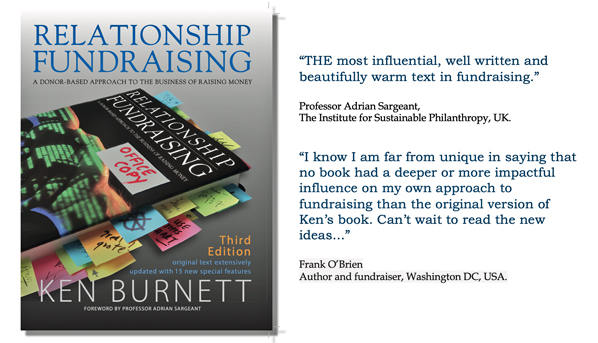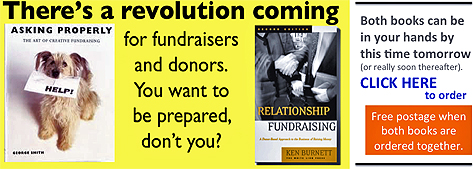|
Blog 20th June 2017 Charities frequently behave as if these tablets of stone are untrue, or as if they’ve never heard of any of them. The paradigm has changed, irrevocably. Factory fundraising and the target-led approach, always questionable, now evidently no longer work well. Those charities that put the donor experience at the heart of their strategies will thrive. Those that don’t, won’t. The reason you should spend more on your donors’ experience is, of course, that it will allow you to spend more on programmes in the near future, not less.
|
Dear concerned charity leader, Here are three points of view I’d like you to consider.
‘Fundraising not about money?’ I hear you ask. ‘How can that be?’ The above quotes do seem counterintuitive to some. Yet, if you think about them, all are profoundly true. If you know a bit about how fundraising works you might even say that all are blindingly obvious. Yet charities frequently behave as if these tablets of stone are untrue, or as if they’ve never heard of any of them. With this in mind it should be almost impossible for anyone to imagine that it isn’t essential for charities to provide their donors with a consistent, reliable, exemplary donor experience. Yet across our sector donor service is patchy at best. Often it’s absent, or misguided. Most fundraising organisations have historically underinvested in looking after their donors. Training in the donor-based approach is thin. Some have focused too much on the money and not enough on the people sending it in. Donors have felt pressurised, subjected to ever more asks, taken for granted. This has to change. We all know that the public is remarkably tolerant and forgiving of charities, allowing them latitude for poor fundraising in the light of the manifold good works that charities do. But the Olive Cooke affair and the sad case of Mr Samuel Rae, echoed as they are by so many others with similar tales, have shown that there’s a firm limit to that tolerance. The past two years of relentless media attacks in the UK have shown that people, including committed donors, now feel less inhibited than hitherto when it comes to condemning bad fundraising practices from seemingly insensitive and over-persistent charities. The paradigm has changed, irrevocably. Factory fundraising and the target-led approach, always questionable, now evidently no longer work well. Those charities that put the donor experience at the heart of their strategies will thrive. Those that don’t, won’t. It isn’t just about money. It’s about… Each of the above justifies the donor-based approach on its own. Together they make an irresistible case for change. Over the past two years the Commission on the Donor Experience, sustained and aided by an army of several thousand contributors and enthusiasts from all parts of the voluntary sector, has been undertaking the mammoth task of defining and documenting the best practices in donor-based fundraising. As part of their 28 projects they’ve collected many hundreds of tips, advices and case histories across all major areas of fundraising in an effort to bring together irresistible evidence of an effective, donor-based approach to the business of raising money, then to make their findings widely and freely available to as many people as possible. Continued top of column 2, above. Home page | Current blogs | Article archive
|
You can download CDE’s 6Ps document here. Continued from column 1, below. CDE will imminently be publishing the full project reports in detail on SOFII, as soon as the ‘beta’ consultation phase has been completed. All are ‘works in progress’. All are evolving and will develop and improve as lessons are learned and fundraisers get better and better at the donor-based approach. Summaries of all CDE projects are also available and the Commission’s ‘6Ps’ document – an 8-page summary of the summaries – is an easy read that should be on every fundraising desk and required reading for every fundraiser in the land. You can find it here. You don’t need to read or absorb all of this vast body of knowledge to realise that a donor-based approach to fundraising is the best way forward for fundraisers and donors, now, or to implement parts or even all of it. But you will no longer be able to say, ‘We didn’t know, or ‘I couldn’t find it’ or ‘We weren’t aware what other fundraisers were up to’. Of course fundraising is about money. But sure as eggs is eggs it isn’t just about money. Just as it isn’t solely the responsibility of the fundraisers in your organisation and it isn’t just about regulation or short-term quick hits and easy asks either. The donor-based approach to fundraising concerns everyone top to bottom across your organisation. Naturally it also requires that all are fully compliant and follow the law scrupulously. But it’s also about doing the right thing, it’s about integrity, listening, care, respect and delivering real value and inspiration for donors as much and as consistently as they deliver what you need, for your cause. Above all, effective donor-based fundraising is about what works, for both your donors and for your cause. As our recent history teaches us all too clearly, one without the other won’t work well, not for long. The reason that you should spend more on your donors’ experience is, of course, that it will allow you to spend more on programmes in the near future, not less. Rather than spending less on one and more on the other, if you get this right you’ll be able to do both, comfortably, to the long-term benefit of both donors and the causes they love. The Commission on the Donor Experience has undertaken its work to show all fundraisers how they can do just that, in detail, day in and day out. If you think education is expensive… try ignorance. Welcome to the detailed findings of the Commission on the Donor Experience. For more on how to access the full reports go to www.donor-experience.com/beta and www.sofii.org. Yours truly, Etc. © Ken Burnett 2017 This article first appeared on the UK Fundraising website. Related earlier blogs:
|
||





